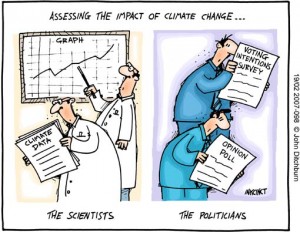Feb 26 2015
Liberals and Conservatives Both Resist Science, But Differently
 There have been a number of studies looking at how ideological belief influence attitudes toward science. It is no surprise that in general people, of whatever ideological bent, engage in motivated reasoning to deny science that appears to contradict their religious or political beliefs. There are different views, however, regarding whether or not the two main political ideologies in the US, liberal and conservative, are equal or substantially different in their resistance to science.
There have been a number of studies looking at how ideological belief influence attitudes toward science. It is no surprise that in general people, of whatever ideological bent, engage in motivated reasoning to deny science that appears to contradict their religious or political beliefs. There are different views, however, regarding whether or not the two main political ideologies in the US, liberal and conservative, are equal or substantially different in their resistance to science.
A series of articles in a special section of The Annals of the American Academy of Political and Social Science explore this question. In a commentary summarizing the findings, Kraft et al write:
The studies presented in the preceding section of the volume consistently find evidence for hyperskepticism toward scientific evidence among ideologues, no matter the domain or context—and this skepticism seems to be stronger among conservatives than liberals. Here, we show that these patterns can be understood as part of a general tendency among individuals to defend their prior attitudes and actively challenge attitudinally incongruent arguments, a tendency that appears to be evident among liberals and conservatives alike.
As is often the case when there are two schools of thought, both are partly right. In this case it appears that the tendency to defend one’s position, resist incongruent evidence, and engage in motivated reasoning is a universal trait among humans. However, the research does consistently show that the magnitude of this effect is greater for conservatives than liberals. No one doubts that this asymmetry is consistently seen in research, but there remains a difference in interpretation.
In one survey analysis by Blank and Shaw they found that liberals were more receptive to information from experts than conservatives or independents. They interpret these results to mean that conservatives are not particularly skeptical of experts, but liberals are particularly receptive.
In a separate study by Nisbet et al they presented subjects with science videos on either evolution, global warming, fracking, nuclear power, astronomy, or geology. They found that conservatives were resistant to scientific information that contradicted their views on evolution and global warming, while liberals resisted information on nuclear power and fracking. No one seems to have a problem with astronomy or geology. (I assume that astronomy did not get into cosmology, and geology did not get into the age of the Earth.)
While liberals and conservatives both resisted information that contradicted their existing political views, the negative reaction of conservatives was four times greater than that of liberals. So again we see the asymmetry.
How do we interpret these results? Those such as Chris Mooney, author of The Republican War on Science, believe the evidence shows the difference is inherent to the ideology. Liberals tend to be more open, by definition, while conservatives tend to be more authoritarian and dogmatic.
In an interview study author Nisbet offered another possible interpretation:
“Climate change and evolution are much bigger issues in the media and political discourse than are fracking and nuclear power,” Nisbet said.
“The fact that the issues that challenge conservatives are currently more polarizing in society today may intensify feelings.”
For me this remains an open question. In these studies it is typical for the issues used to test Republican resistance to science to be evolution and global warming. The former involves religious beliefs, while the latter is a hot button political issue. Nuclear power just doesn’t have the same cultural power these days of these other topics. Perhaps, therefore, the asymmetry is in the topics used, not the subjects. Of course, both answers could be correct – there may be asymmetries in both the ideological resistance to science and in the topics used to study the phenomenon.
One way to resolve this debate is to conduct similar studies but with a larger variety of issues, with particular attention to balancing the intensity of the issues themselves. There are many other issues to choose from where strongly held ideological beliefs might clash with scientific facts – gun control, abortion, risk of rape, effectiveness of the death penalty, etc.
There is a potential inherent problem, however, in that conservative and liberal is a bit of a false dichotomy when it comes to American politics. Where do libertarians fit it? Fiscal conservatives are different than the religious right. Social progressives may be different than populists. Anti-government and anti-corporate sentiments can cross the simple divide between liberal and conservative.
Opposition to GMOs is an excellent example. This might be a good topic to study, in that the intensity is likely on a par with issues such as evolution and global warming. The problem, however, is that anti-GMO sentiments are bipartisan. Some liberals oppose GMOs because of anti-corporate ideology, adherence to the naturalistic fallacy, and extreme application of the precautionary principle. Some conservatives oppose GMOs because they don’t trust the government. Meanwhile conspiracy theorists don’t trust anyone.
Still, to answer to core question here, it might be useful to study liberals who oppose GMOs based on liberal ideology to see if their reaction is similar to conservatives who oppose global warming.
Conclusion
Until further studies are done, over a greater range of issues to better control for any asymmetry in issue intensity, I am reserving judgment about whether or not liberals or conservatives are more resistant to or accepting of science.
Meanwhile, what is clear is that people in general will tend to engage in motivated reasoning to defend existing beliefs from contradictory evidence – even scientific evidence from experts.






